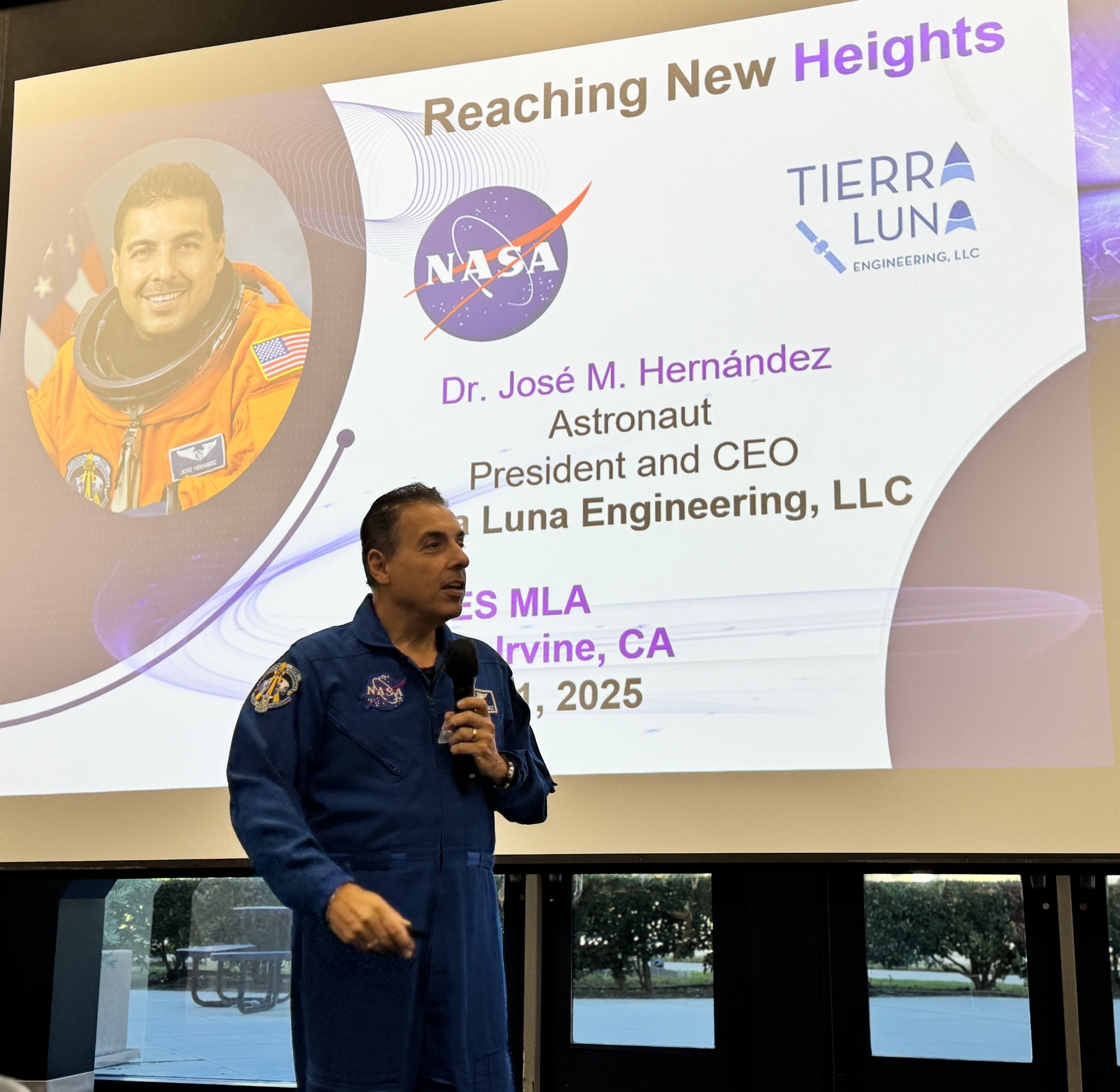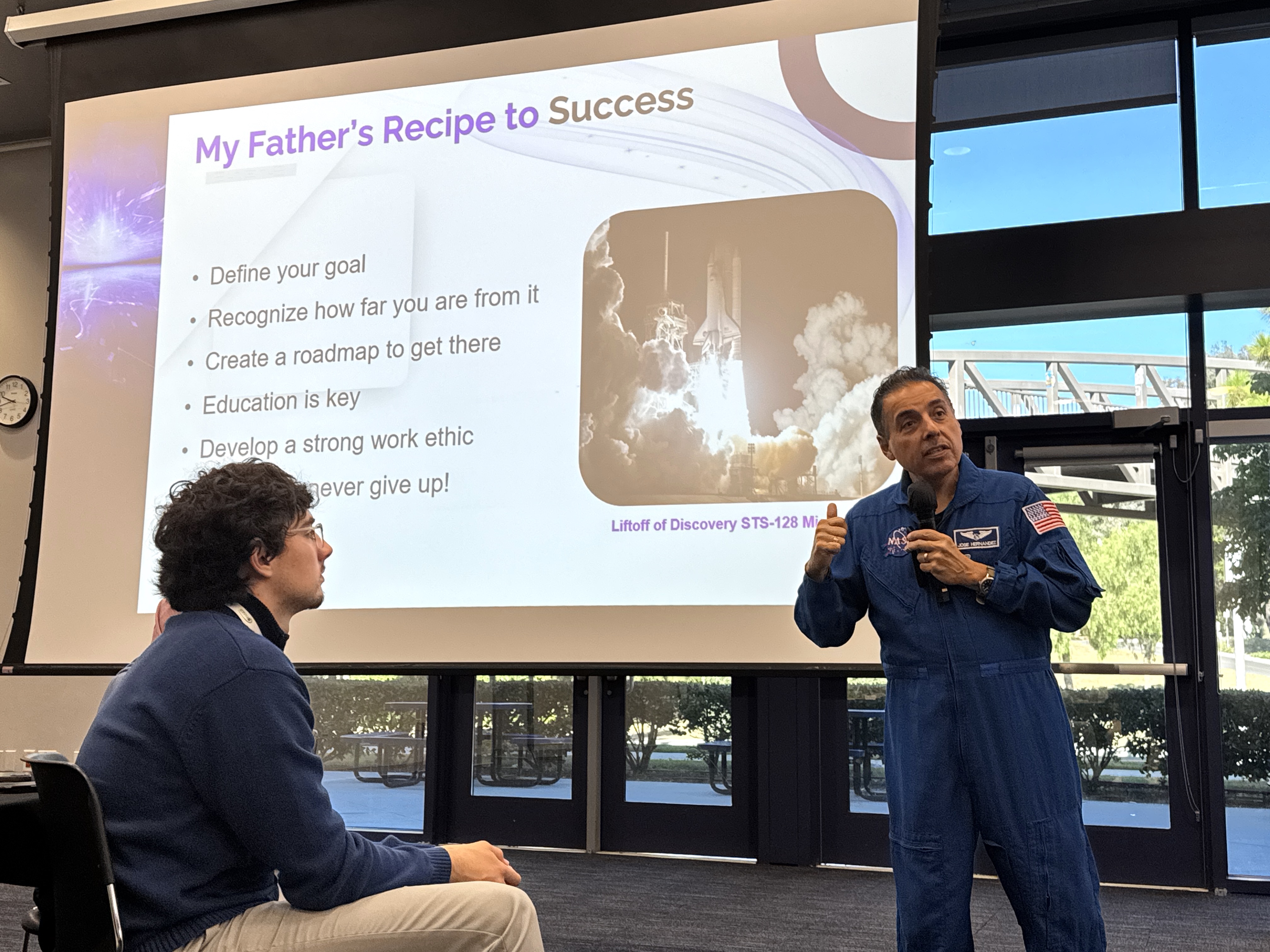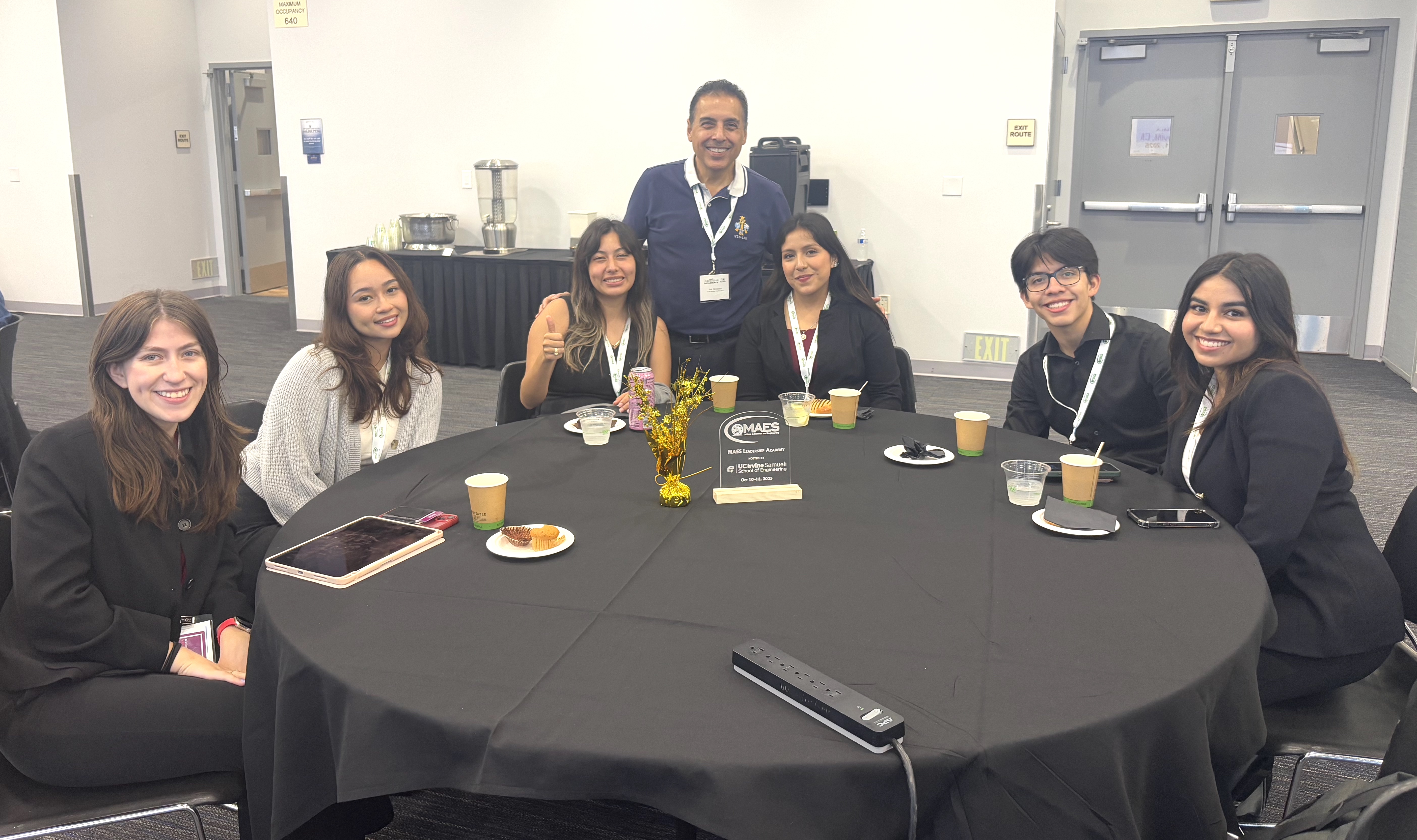NASA Astronaut José Hernández Inspires STEM students at the 2025 MAES Leadership Academy at UC Irvine

Oct. 31, 2025 - José Hernández, the first migrant farmer-turned-astronaut, graced UC Irvine on October 11, inspiring STEM students at the national MAES (Latinos in Science and Engineering) Leadership Academy hosted by the UC Irvine Samueli School of Engineering.
With warmth, wit and humor, José Hernández, a University of California Regent, shared his dramatic journey from migrant farmer to NASA astronaut. José Hernández was a 10-year-old farmworker when he decided to become an astronaut. He had just seen Apollo 17 astronauts Gene Cernan and Harrison Schmitt walk on the moon on television. Hernández ran outside to look up at the moon and then, with trepidation, told his father his dream.
His father was a migrant farmer whose expertise was taking his family to harvest strawberries, cherries and cucumbers and other produce. With only a third-grade education, he looked his son in the eyes and said, “I think you can do it, but if you really want to do this, you need to follow my recipe for success.” At the conference, Hernández shared that five-ingredient recipe, which he followed to become an astronaut: define your goal, recognize how far you are from it, create a roadmap to get there, educate and prepare yourself for the challenge, and always give more than what people expect.

Hernández’s dream to become an astronaut guided every decision he made from then on. He went on to graduate from the University of the Pacific in electrical engineering and received a master of science degree in electrical and computer engineering from UC Santa Barbara. He then worked at the Lawrence Livermore National Laboratory as a electronics engineer where he and a colleague developed the first full-field digital mammography imaging system. He counts that as the achievement he’s most proud of because the invention has aided countless women in the early detection of breast cancer.
As an engineer, he applied for NASA astronaut training year after year where only 10 to 15 candidates were accepted out of a pool of nearly 13,000 qualified applicants. He was turned down six times. The sixth time, he wanted to quit and threw the NASA letter in the trash can but missed. His wife saw that crumpled letter and gave him what he calls “a dose of tough love.” She picked up the letter and made him read the last line out loud, which welcomed him to apply again. She also inspired him to consider what the finalists had that he didn’t have, which he shared as a key strategy for achieving one’s dreams: see what others whom you aspire to be like have achieved. He discovered aside from meeting the minimum requirements, the astronaut candidates were all pilots, scuba divers, and spoke the language of another space partner.
In the following years, Hernández became a pilot, a master scuba diver, and learned Russian as the U.S. and Russia had just signed an agreement to build an International Space Station. For six years, he traveled back and forth from Siberia to help the U.S. and Russia dismantle Russian nuclear weapons as part of the Highly Enriched Uranium Implementation Program. Hernández believes that experience clinched the deal.
After 11 rejections, in 2001, NASA accepted him as a candidate for astronaut training. In August 2009, Hernández became a flight engineer on Space Shuttle mission STS-128 aboard the Space Shuttle Discovery where he said he had “the best seat in the house” as he sat right between the two pilots and was the only astronaut with a panoramic view. Hernández was the first astronaut to tweet in Spanish from outer space.
The journey to achieving his dream was not easy. “Imposter syndrome happens at all levels,” Hernández said. “When that happens, take a safety time out. Focus on your past accomplishments. Convince yourself that you belong. Throw that imposter syndrome out the window and believe in yourself.”
As one of the most prominent Latinos in the nation, Hernández hopes to encourage all who attended to pursue their dreams. “José Hernández truly inspired me because even though he was continuously getting rejected, he kept going and never gave up. That shows true determination,” said UCI earth systems sciences junior Tyler Rosales.
Hernández’s life story is portrayed in the movie "A Million Miles Away." Active in the Latino STEM community since he was a student, he was also the former national president for MAES.
He also believes that people should continue to set new goals and reinvent oneself. After leaving NASA, Hernández started his own engineering consulting company, wrote three books, and came full circle as he now owns and operates a vineyard where he produces his own wines under the Tierra Luna Cellars label.
Sixty-six Latino STEM student leaders from MAES chapters at 12 universities across the nation attended the MAES Leadership Academy. The conference also included speeches from UCI mechanical and aerospace professor and chair Julián Rímoli, UCI assistant professor in physics and astronomy Luis Jáuregui and UCI materials science and engineering professor Regina Ragan. Many were inspired by the speakers and the opportunity to learn and meet others in the MAES community.

“Meeting professionals and fellow students at the MAES conference helped me learn how to navigate parts of my professional life post-grad in order to pass some of that knowledge onto other students at my chapter,” said MIT computer science and engineering student Victor Rosales, MIT’s former MAES chapter president. “I look forward to sending other MIT MAES members back in future years!”
“MAES has been instrumental in my growth at UCI,” said UCI mechanical engineering senior and internal VP for MAES Alyssa Gomez. “Connecting with professionals like Retired NASA Astronaut José M. Hernández, and hearing from an organization that has given me so much, was truly inspiring and reminded me why I strive to keep moving forward.”
- Natalie Tso
